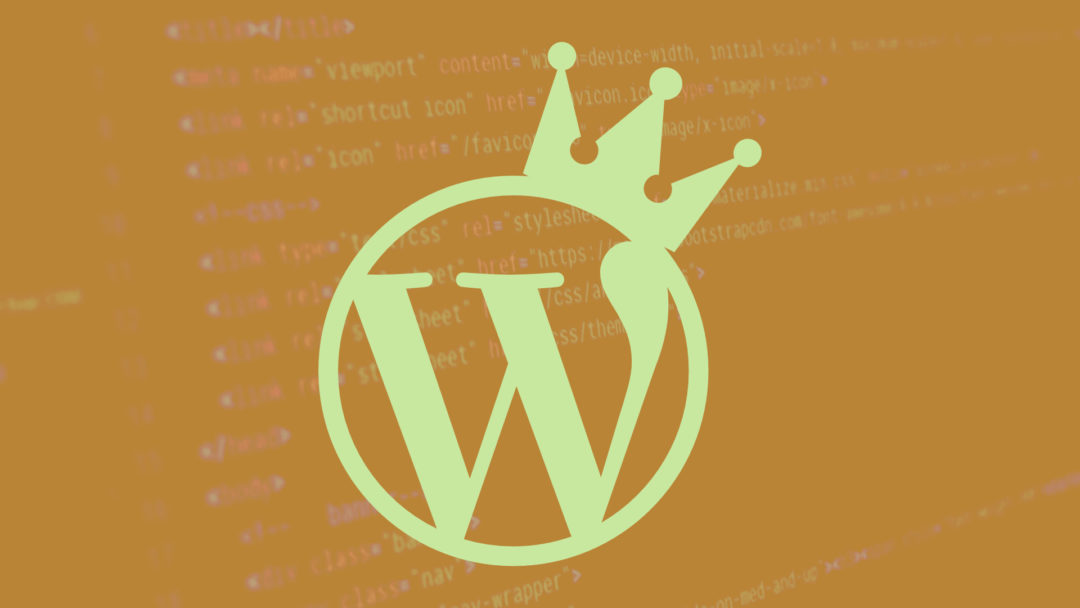Pain Points often arise, even with the most popular platforms, and WordPress is no exception. WordPress recently passed the 33% market share mark, meaning 1 out of every 3 websites is now powered by WordPress! Crazy, right? It’s by far the most widely used content management system in existence, with 60% of all websites where the CMS used is known. It’s a free, open-source CMS that has spawned thousands of businesses, some of which generate several million dollars per year. Plus, over 55,000 plugins and thousands of themes are available for it, allowing you to build a variety of different websites. However, no product is perfect, and WordPress does come with its challenges.
In this post, we’re going to examine what makes WordPress so popular before diving into a few of the biggest issues individuals and small businesses alike experience while using the CMS. We’ll also go over a few honorable mentions before wrapping up with a few tips on how to avoid these issues. Let’s get into it.
Why WordPress is King

We already went over a few different reasons why WordPress reigns supreme in the land of content management systems:
- Open-source.
- Wide range of themes and plugins available.
- Versatile.
- Profitable.
These aspects are why WordPress continues to dominate even with competition from CMS’s like Drupal and Joomla as well as all-in-one solutions like Squarespace and Wix. It was originally developed as a blogging platform and has grown to become one of the simplest ways to build a website for nearly any purpose, be it business, ecommerce, social networking and more. Plus, it’s supported by almost every web host in the industry, as well as millions of users around the world.
However, like Louis XIV, James I, Augustus of Rome and every other great monarch in history, any king is bound to falter at some point in their reign, and WordPress is no different.
When Kings Fall
All CMS’s and web building platforms have flaws, but WordPress has a few that negatively impact site owners’ businesses and workflows tremendously. According to a survey published by Pagely in 2018 as well as user accounts published all over the web, the most common issues WordPress users face can be grouped into the following pain points:

We’re going to talk about the individual issues users experience in regards to each of these pain points. We’ll also go over one other pain point before discussing a few honorable mentions.
Why This Topic is Important
So, WordPress has flaws… who doesn’t? Why should you bother focusing on the negative aspects of the most widely used CMS in the industry? Well, the competition I mentioned earlier is one reason (or several). As Squarespace continues to utilize aggressive ad campaigns, popularity in all-in-one solutions are on the rise now more than ever. If you’re dedicated to this community and want to continue seeing WordPress dominate, you need to be willing to recognize its flaws and help fix them.
The second reason is your site’s (or your clients’ sites’) overall performance. Just like brick-and-mortar businesses need bodies in their buildings to generate revenue, online businesses need traffic on their websites in order to succeed. You can’t do that if your site is slow and has a poor security reputation. Learning about a few of the issues you may face in your time as a WordPress user will help you improve your site’s overall performance and encourage visitors to stick around long enough to be converted into customers.
Let’s shift focus and get more specific. Here are the biggest pain points WordPress users experience on their websites.
WordPress Security
WordPress security is a common concern among users. WordPress core is a very secure piece of software on its own. Unfortunately, WordPress as a whole continues to be one of the most widely hacked CMS’s in the industry. This is largely caused by user error and WordPress’ high usage rate, making it a popular target among hackers. Every WordPress update comes with some security fix or another. However, multiple studies and surveys published around the net, such as this one by Hashed Out, state that about half of all websites built with WordPress are not updated to the latest version and over a third are at least two versions behind.

The other issue has more to do with WordPress being an open-source, self-hosted solution. Tens of thousands of third-party plugins are available for it. If you aren’t careful, you could wind up installing a poorly-coded, unsupported plugin filled with security flaws. On top of that, WordPress requires you to supply your own hosting server, forcing users to find a quality host that offers secure servers, SSL certificates, a firewall, and malware protection. If they don’t, you‘re required to implement this yourself or find a plugin to do it for you.
Website Performance
Site performance, especially load time, is another popular complaint among WordPress users. Again, this is mostly due to WordPress’ open-source nature. The ability to change the design of your website with a few simple clicks and add numerous functionalities without needing to know how to code is wonderful, but it can also be dangerous. Every new theme and plugin adds new code to your site. A single poorly-coded plugin can have a negative effect on your site’s speed and performance. Plus, the more plugins you install, the more likely to experience a drop in performance.

Plugin, Theme, & WordPress Updates
I mentioned how a lot of the security issues surrounding WordPress has to do with outdated versions of WordPress core and plugins. This is due to another pain point expressed by WordPress site owners. Since WordPress is a self-hosted solution, site owners are expected to handle updates on their own. However, since updates have a likelihood, of breaking the sites they’re implemented on, many find the responsibility of managing updates to be resource-heavy or completely over their heads.
Updates are a major pain point for many website owners. They want to update WordPress, the theme, and all plugins to be sure that their website is running the latest and most secure versions. But they’re afraid to update because of the potential to have something break that they’re incapable of fixing.
Plugin Management
Not only are WordPress users unsure of updates, they’re overwhelmed with plugin management in general. Updates do play a heavy role in this pain point, but there are other factors as well.
First, plugins need to be researched properly before you install them. Developers know what they’re looking for, but it still eats up a lot of time. General users, on the other hand, have no idea what to look for and need to rely on the advice of others.
Second, third-party plugins do have a possibility of becoming unsupported. When this happens, they have a higher likelihood of breaking sites and becoming a security liability. As a result, site owners are expected to research the plugins they use periodically, to ensure they’ve been updated and are still supported by their developers. If not, they need to be replaced.
Honorable Mention Pain Points
A lot of people apply the phrase “jack of all trades, master of none” to WordPress, and they’re not wrong. There are tens of thousands of third-party solutions available for this CMS due to its popularity as an open-source platform. As I said earlier, you can use it to build just about any type of website and add just about any functionality to it. Unfortunately, this is bad for consumers who want a simple solution. It can also be overwhelming when there are multiple solutions available for the same problem.
Let’s wrap up with a few honorable mentions of pain points that WordPress website owners face:
- Disappearing web developers! Many people have told us their stories of having experienced their developer (or even web hosts in some extreme cases) disappearing shortly after the site is launched. That leaves them with a lot of work on their hands, and nowhere to turn when they get stuck.
- Migrating WordPress from one host to another. This is no easy task, unless you know the right tools to use. And even then, it’s not for the newb. This includes trying to migrate a site built locally to a live server.
- Some users have cited “plugin bloat” as an issue. This is when a developer starts adding more and more features to a plugin beyond what was originally intended, or beyond what the website owner needs. The result is a plugin that does too much and hogs resources.
How to Avoid Website Pain Points
So whats the antidote? What’s the magic pill you can take to relieve your pain as a website owner? You can implement your own security, streamline WordPress updates by creating a maintenance schedule, and improve performance by optimizing images and installing a caching plugin. Avoiding these pain points can be very time consuming and even stressful, adding another kind of pain. Or you could switch to another platform that doesn’t have all the pains of WordPress. But then you’d loose all the functionality and flexibility as well.

However, if you’re a busy site owner who needs to spend more time on your business and less time tinkering with your website, there is a magic pill you can take to both relieve and cure your pain! If you haven’t guessed, it’s what we do. You can hire a company like us that does WordPress maintenance and support to manage, secure, optimize, and update your website for you!
Using A WordPress Maintenance & Support Service
Warning: Incoming shameless self-promotion.
wpXPRESS is the medicine you need! The very solutions to the pain that website owners feel, are exactly the solutions we provide here at wpXPRESS. We love taking care of our members’ websites. We remove all that hassle and stress I talked about above. Plus we address the main pain points directly: we secure your website and regularly scan it for malware, improve it’s speed, update everything regularly, manage plugins, and send you a report about everything we do each month. Plus we’re available 24/7 to make changes and updates on your site so you don’t have to remember how to go in and do it!

You get all this, for a very reasonable monthly membership. It’s like hiring a full-time employee to take care of the website, but without the cost!
Depending on which wpXPRESS plan you choose, you can get the following time-saving and stress-preventing features:
- Content and WordPress updates.
- Installation and configuration of iThemes Security Pro to improve security.
- Daily malware scanning with Sucuri.
- Daily or weekly backups to the cloud, should something go wrong.
- 24/7 monitoring with Uptime Robot to ensure your site stays live.
- Installation and optimization of WP Rocket to increase performance.
- Installation and configuration of Imagify for image optimization.
- Database optimization to increase performance.
- Hosting with free site migrations.
- Lots of awesome premium plugins to help generate more leads, gain search ranking, and more.
- Much more!
Visit our Plans page to learn more. You can also visit our FAQ section and ask us questions directly. Let us know your biggest pain points in the comments below.





As always, love the content here! Thanks, wpXPRESS Team!
Great Article! Thanks for this. I’d love to learn more about Caching Plugins! What do they do? How do they work? Your top three favorite caching plugins (and their pros/cons). Keep up the great work!
Heather wrote about some of the basics here: https://wpxpress.com/how-do-i-increase-my-websites-speed/. You can also check out WP Rocket, the caching plugin we recommend. They’ve got a great blog and knowledge base, with lots of information.
Lyn, thank you for great suggestions for website security for WordPress. It is much easier for cybercriminals to infiltrate outdated versions of WordPress core and plugins with their malicious code. Awesome article!!